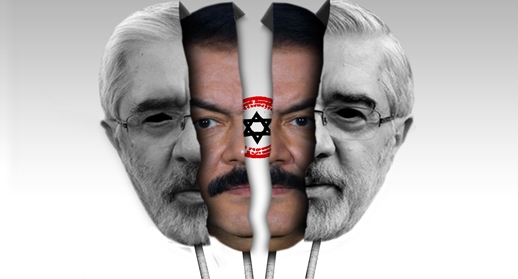| Sources close to the anti-Iran terrorist Mojahedin-e Khalq Organization revealed that MKO had played a key role in the Monday unrests in the Iranian capital. |

http://english.farsnews.com/newstext.php?nn=8911301059
The Habilian Association, an Iran-based human rights group formed by the family members of the Iranian victims of terrorism, quoted reliable sources as saying that MKO's surrogate ringleader Maryam Rajavi had dispatched several operational teams to Tehran and had been in constant contact with the team members until the end of unrests.
"Mayam Rajavi was in direct contact with the operational units dispatched to Tehran and ordered them to spray live fire on the public who had risen to stand against the few seditionists," Habilian said.
"In this terrorist operation which took place in Tehran's Qasroddasht neighborhood on Monday February 14, the Basiji student, Saneh Zhaleh, was martyred and four others were severely wounded," it added.
"A student activist in France disclosed that over 350 members of the MKO had been sent from several European and Asian countries to Tehran and other major Iranian cities, based on plan drawn by the main ringleader of the MKO, Massoud Rajavi," the Habilian website said.
The website said the MKO teams intended to start riots, set fire on garbage cans, destroy public amenities and private properties and shoot and kill the large number of the self-driven people who had come to defend the Islamic Republic and the government against the seditionists in a bid to provoke the police and security forces into reciprocating the gunfire to create a pool of blood in the capital and to escalate the unrests.
But after police refrained from armed clashes with the seditionists and the public pushed the seditionists back, the MKO plot ended in failure, the website added.
Several groups of seditionists staged riots in western Tehran on Monday afternoon. Rioters damaged public amenities and private buildings and properties and set up roadblocks by setting fire on garbage cans during the rush hour in the Iranian capital.
Rioters opened fire at the public and police troops, killing one university student on the scene and wounding 9 more. One of those wounded in the incident also died at the hospital.
Tehran's police tried to disperse the rioters, but did not reciprocate the gunfire. Police officials announced on Tuesday that most of those wounded in the incident were security and police troops.
According to police officials, the seditionists had hatched a plot to get the police and security forces involved in armed clashes to allege that they had been treated violently, but they failed to do so.
The MKO, whose main stronghold is in Iraq, is blacklisted by much of the international community, including the United States.
Before an overture by the EU, the MKO was on the European Union's list of terrorist organizations subject to an EU-wide assets freeze. Yet, the MKO puppet leader, Maryam Rajavi, who has residency in France, regularly visited Brussels and despite the ban enjoyed full freedom in Europe.
The MKO is behind a slew of assassinations and bombings inside Iran, a number of EU parliamentarians said in a recent letter in which they slammed a British court decision to remove the MKO from the British terror list. The EU officials also added that the group has no public support within Iran because of their role in helping Saddam Hussein in the Iraqi imposed war on Iran (1980-1988).
Many of the MKO members abandoned the terrorist organization while most of those still remaining in the camp are said to be willing to quit but are under pressure and torture not to do so.
A May 2005 Human Rights Watch report accused the MKO of running prison camps in Iraq and committing human rights violations.
According to the Human Rights Watch report, the outlawed group puts defectors under torture and jail terms.
The group, founded in the 1960s, blended elements of Islamism and Stalinism and participated in the overthrow of the US-backed Shah of Iran in 1979. Ahead of the revolution, the MKO conducted attacks and assassinations against both Iranian and Western targets.
Leaders of the group have been fighting to shed its terrorist tag after a series of bloody anti-Western attacks in the 1970s, and nearly 30 years of violent struggle against the Islamic Republic of Iran.
The group started assassination of the citizens and officials after the revolution in a bid to take control of the newly established Islamic Republic. It killed several of Iran's new leaders in the early years after the revolution, including the then President, Mohammad Ali Rajayee, Prime Minister, Mohammad Javad Bahonar and the Judiciary Chief, Mohammad Hossein Beheshti who were killed in bomb attacks by MKO members in 1981.
The group fled to Iraq in 1986, where it was protected by Saddam Hussein and where it helped the Iraqi dictator suppress Shiite and Kurd uprisings in the country.
The terrorist group joined Saddam's army during the Iraqi imposed war on Iran (1980-1988) and helped Saddam and killed thousands of Iranian civilians and soldiers during the US-backed Iraqi imposed war on Iran.
Since the 2003 US invasion of Iraq, the group, which now adheres to a pro-free-market philosophy, has been strongly backed by neo-conservatives in the United States, who also argue for the MKO to be taken off the US terror list.
The MKO has been in Iraq's Diyala province since the 1980s.
Iraqi security forces took control of the training base of the MKO at Camp Ashraf - about 60km (37 miles) north of Baghdad - last year and detained dozens of the members of the terrorist group.
The Iraqi authority also changed the name of the military center from Camp Ashraf to the Camp of New Iraq.
